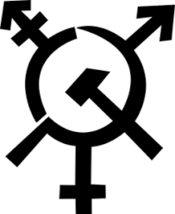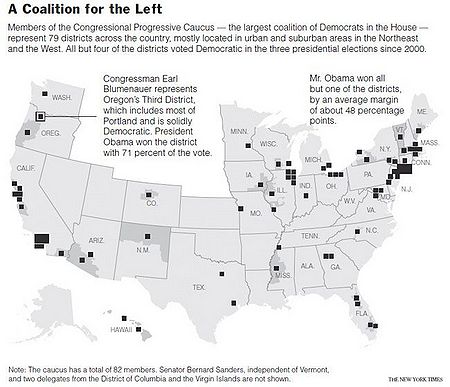Difference between revisions of "Congressional Progressive Caucus"
(→Members) |
(→External links) |
||
| Line 46: | Line 46: | ||
* [https://www.nytimes.com/2009/10/18/us/politics/18liberal.html Clark Hulse, "Frustrated Liberal Lawmaker Balances Beliefs and Politics," ''New York Times'' Oct. 19, 2009], profile of Rep. Earl Blumenauer of Oregon on the failures of the Progressive Caucus in 2009 | * [https://www.nytimes.com/2009/10/18/us/politics/18liberal.html Clark Hulse, "Frustrated Liberal Lawmaker Balances Beliefs and Politics," ''New York Times'' Oct. 19, 2009], profile of Rep. Earl Blumenauer of Oregon on the failures of the Progressive Caucus in 2009 | ||
| + | [[category:United States House of Representatives]] | ||
[[Category:Liberalism]] | [[Category:Liberalism]] | ||
[[Category:Leftism]] | [[Category:Leftism]] | ||
Revision as of 22:19, February 9, 2019
The Congressional Progressive Caucus (CPC) is an openly Marxist group of Democratic party congressmembers advocating for single party control of the U.S. government and disposal of the United States Constitution. As of 2019, it has 95 members or about 40% of elected Democrat House members.[1]
Contents
Background
The caucus was founded in 1991 by Bernie Sanders[2] —the openly socialist then Congressman from Vermont, Democratic Socialists of America (DSA) and the radical Washington DC based "think tank" Institute for Policy Studies (IPS). The Congressional Progressive Caucus is an informal alliance of 95 far left and liberal and Congressional members in the U.S. House. They push for overhaul and scrapping major laws.
Many members are linked to the Democratic Socialists and/or the Communist Party USA, IPS or other radical organizations.
From small beginnings the CPC grew to embrace more than 95 members of Congress and three in the Senate - Roland Burris, Bernie Sanders and Tom Udall (NM).
Members
The co-chairs are Rep. Raúl M. Grijalva of Arizona and Lynn Woolsey of California. Most members represent big-city districts, especially in the Northeast and West Coast. Most were elected by landslides and do not have to worry about reelection. Since the term "liberal" is out of fashion, they use "progressive." The Caucus was founded in 1991. No Republican has ever belonged.
The Progressive Caucus overlaps heavily with the Congressional Black Caucus (which discriminates on the basis of race against white members).
116th Congress
2018 Congressional Progressive Caucus new members included Alexandria Ocasio-Cortez, Rashida Tlaib, Ilhan Omar, Ayanna Pressley, Deb Haaland, Veronica Escobar, Jesus Garcia, Joe Neguse, Andy Levin, Mike Levin.[3]
Past members
Many powerful committee and subcommittee chairs belong to it; Speaker Nancy Pelosi was a member until she became party leader. Influential members include:
- Barbara Lee (Calif.)- Chairwoman, Congressional Black Caucus
- Bob Brady (Penn.) - Chairman, House Administration Committee
- Barney Frank (Mass.)- Chairman, House Financial Services Committee
- Bob Filner (Calif.)- Chairman, House Veterans Affairs Committee
- George Miller (Calif.)- Chairman, House Education and Labor Committee
- Charles Rangel (NY) - Chairman, House Ways and Means Committee
- Louise Slaughter (NY)- Chairwoman, House Rules Committee
- Bennie Thompson (Miss.) - Chairman, House Homeland Security Committee
- Nydia Velazquez (NY) - Chairwoman, House Small Business Committee
- Henry Waxman (Calif.)- Chairman, House Energy and Commerce Committee
See also
References
- ↑ https://m.theepochtimes.com/congressional-progressive-caucus-has-extensive-ties-to-marxist-organizations_2719131.html
- ↑ In 1998, the Congressional Progressive Caucus founded by Sanders had the song Red Revolution, a song advocating communist revolution, featured on a website that they shared with the Democratic Socialists of America. Reference: "IS BERNIE SANDERS A COMMUNIST"
- ↑ [1]
External links
- official caucus website
- DiscoverTheNetworks, conservative guide
- Clark Hulse, "Frustrated Liberal Lawmaker Balances Beliefs and Politics," New York Times Oct. 19, 2009, profile of Rep. Earl Blumenauer of Oregon on the failures of the Progressive Caucus in 2009

